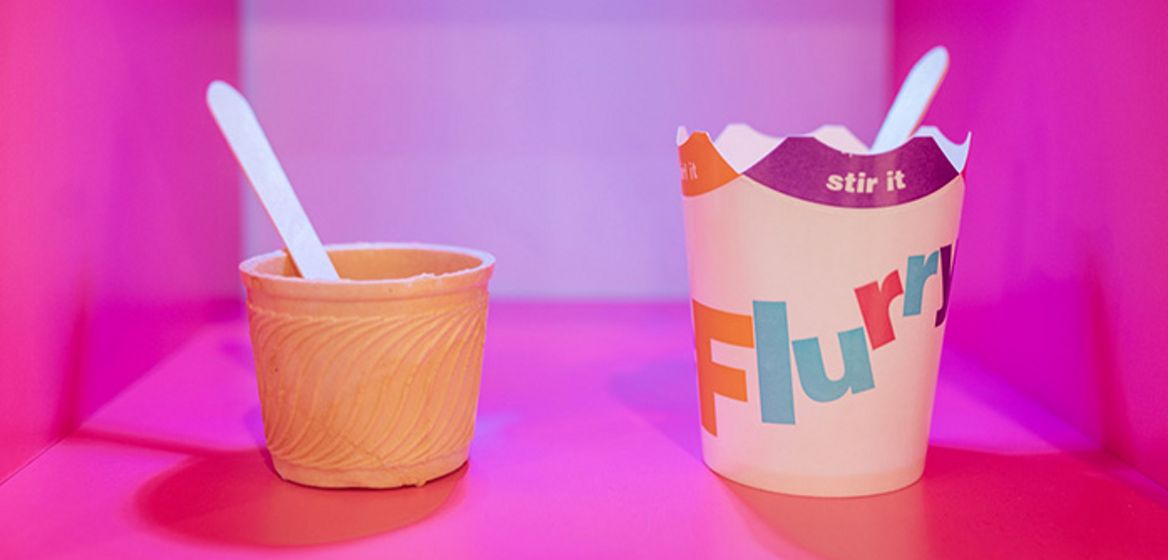What we learned from Berlin’s plastic-free McDonald’s experiment
August 28, 2019
A lot goes into environmentally sustainable packaging.
We need to comply with upcoming regulations (a ban on many single-use plastic items in the European Union is taking effect in 2021). We want our customers to know we care about the environment. But above all, we want to create a more innovative, better McDonald’s.
So, in June, we opened the Better McDonald’s Store - a nearly plastic-free restaurant in Berlin for 10 days.
We really went all in. Edible waffle cups replaced condiment sachets and containers. Paper straws replaced plastic straws. Wooden cutlery replaced plastic cutlery. Sandwiches were wrapped in packaging made from grass, not paper. And Chicken McNuggets were served in paper bags, rather than cardboard boxes.
The idea wasn’t to make every sustainable packaging change at once. Instead, it was to facilitate an open discussion about what works, what doesn’t, and the challenges with possible solutions between McDonald’s, our customers and various stakeholders. It was also an opportunity for customers and stakeholders to experience various solutions and provide us with feedback, which we’re already taking to heart.
“Normally, McDonald’s goes out with perfect solutions. This time we said, ‘We don’t have perfect solutions yet… please help us!’” explains Diana Wicht, Sustainability Department Head for McDonald’s Germany.
We’re not ready to implement all of these changes right now, but we're launching pilots and making changes to make our packaging around the globe more sustainable. We’re eager to get feedback from our customers and the stakeholders who care about creating a more sustainable future – and we definitely learned a lot from the Better McDonald’s Store.
For instance, the response to the Better McDonald’s Store and sustainable packaging efforts was very positive. The grass wrapper was a hit in terms of eco-friendliness and ease of use. Many people felt the edible waffle cups were a good alternative to the current sauce and dip sachets and containers (though we learned the shape should be modified for dipping Chicken McNuggets). Our customers believed the paper straws were eco-friendly, but had challenges with respect to ease of use and durability – and we learned that many in-store guests believe eliminating the lid entirely would be a perfectly feasible solution.
We also learned that wooden cutlery isn’t many peoples’ favorite option, as one in two guests disliked the “woody” taste of the spoon.
Yes, the Better McDonald’s Store was largely experimental. But many of our German restaurants have implemented sustainable practices that are already making an impact.
Right now, for example, all McDonald’s restaurants in Germany serve all of their in-house hot drinks in porcelain or glass mugs, rather than paper cups with plastic lids. And since 2016, customers who’ve visited McCafé locations in Germany have had the option to bring their own cups to receive a 10 cent discount on their order.
“We got great feedback in the media after the reusable cup announcement,” Diana says. After all, a major brand was making moves to be more sustainable
But there was one problem with the McDonald’s reusable cup program. “Not that many people in Germany have their own cup in their bag at all times,” Diana explains. For that reason, about 30 of our German restaurants began participating in a deposit system for reusable carry out cups.
Here’s how it works: Customers pay a deposit of 1 euro to receive their McDonald’s drink in a reusable carry out cup, which they hold on to as long as they like. Then, when they eventually want to get rid of their cup, they can simply return it to any restaurant that’s participating in the program to get their 1 euro back. Because the program is not strictly a McDonald’s solution, people can technically return their cups elsewhere – which makes it more convenient for our customers.
This cup deposit system – ReCup – was one of the winners of the McDonald’s-sponsored NextGen Cup Challenge. We’re hopeful that ReCup, as well as our other sustainability initiatives, will have a real impact across Germany – and that we ultimately become the better, more innovative McDonald’s we strive to be.
Germany is not alone in its mission to become more sustainable. McDonald’s UK is removing plastic lids from all of its McFlurry options, a change that will reduce plastic waste by 383 metric tons per year. The UK will also remove single-use plastic from salads; main meal and side salads will now be served in 100% renewable and recyclable cardboard containers.
McDonald's Canada, meanwhile, has switched to napkins that are 20% smaller and produced with 100% recycled fiber. The market is also switching from a McWrap® carton to a McWrap wrap.
As we continue to make our packaging more sustainable, we are excited to take our learnings from pilot programs and events like ReCup and the Better McDonald’s Store to inform our strategy and ensure our customers love our sustainable packaging as much as our old packaging. The Better McDonald’s Store is already being replicated in other markets – McDonald’s Canada has opened two similar “Green Concept Restaurants” in Ontario and British Columbia.
We’re actively testing new packaging solutions and recycling initiatives in our restaurants around the world. By using our restaurants as mini innovation hubs, we can hear what our customers think and identify which solutions are the best to accelerate and scale-up and globally.

